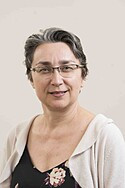Scientific research has demonstrated links between environmental exposures and the development of childhood cancers. Furthermore, studies have shown that childhood cancer survivors are more vulnerable to the adverse effects of environmental risks such as air pollution. Leukemia is the most common cancer in children living in industrialized countries, with incidence rates dramatically increasing in the past few decades in certain populations. This rapid upward trend points to the important role of the “environment” in a broad sense, whether acting alone or in concert with genetic factors. During this webinar, Dr. Catherine Metayer will present results on children’s and parents’ exposures to carcinogens such as those contained in paints, solvents, pesticides, air pollution, and tobacco smoke and the risk of childhood leukemia. Dr. Metayer will also discuss maternal diet during pregnancy and prenatal folate/vitamin supplementation and the reduced risk of childhood leukemia. She will conclude, highlighting the need for prevention programs to reduce harmful environmental exposures and promote healthy lifestyles, especially targeting vulnerable populations.
There are a number of potential air and water pollutants emitted during unconventional oil and gas operations that may be harmful to human health, including carcinogens like benzene. Dr. Shaina L. Stacy’s research in Pennsylvania has contributed to a growing body of work, which suggests living close to unconventional gas development can lead to adverse infant health outcomes. Dr. Stacy will discuss this previous research, as well as ongoing work investigating potential impacts on childhood cancer risk, particularly leukemia. To conclude, she will highlight recommendations for how scientists can design and conduct improved epidemiology studies of the health effects of unconventional gas development going forward.
Fine particulate matter air pollution is a known risk factor for respiratory illness that is especially potent among persons with pre-existing pulmonary conditions. Childhood cancer survivors have a high propensity for severe lung conditions due to the long-term toxicities of cancer treatment. The effect of air pollution on the risk for adverse respiratory events among cancer survivors has not been widely studied. During this presentation, Dr. Judy Y. Ou will present novel research on the association between exposure to fine particulate matter and respiratory healthcare events in a young cancer cohort in Utah, a state with severe short-term particulate matter pollution.
Featured Speakers
 Dr. Metayer received her medical degree from the University of Bordeaux II School of Medicine in France, and her Ph.D. in Epidemiology from Tulane University, School of Public Health. She is currently Professor at the UC Berkeley, School of Public Health, Division of Epidemiology and Biostatistics. Prior to joining UC Berkeley, Dr. Metayer was a scientist at the US National Cancer Institute, Division of Cancer Epidemiology and Genetics. She is the Principal Investigator of the California Childhood Leukemia Study and Director of the Center for Integrative Research on Childhood Leukemia and the Environment (CIRCLE), a federally funded Children's Environmental Health Center. She is also the outgoing Chair of the Childhood Leukemia International Consortium. Her work focuses on environmental and genetic risk factors of leukemia and other cancers in children and adolescents in California and globally.
Dr. Metayer received her medical degree from the University of Bordeaux II School of Medicine in France, and her Ph.D. in Epidemiology from Tulane University, School of Public Health. She is currently Professor at the UC Berkeley, School of Public Health, Division of Epidemiology and Biostatistics. Prior to joining UC Berkeley, Dr. Metayer was a scientist at the US National Cancer Institute, Division of Cancer Epidemiology and Genetics. She is the Principal Investigator of the California Childhood Leukemia Study and Director of the Center for Integrative Research on Childhood Leukemia and the Environment (CIRCLE), a federally funded Children's Environmental Health Center. She is also the outgoing Chair of the Childhood Leukemia International Consortium. Her work focuses on environmental and genetic risk factors of leukemia and other cancers in children and adolescents in California and globally.
 Dr. Judy Y. Ou, PhD MPH is a Research Scientist with the Kirchhoff research team at the Huntsman Cancer Institute. Dr. Ou seeks to understand how the long-term health of cancer survivors is affected by exposure to both environmental pollution and cancer therapies with known pulmonary and cardiovascular toxicities. This novel research is at the intersection of the environmental health and oncologic sciences. Prior to joining Dr. Kirchhoff’s team, Dr. Ou received her doctorate from Boston University School of Public Health.
Dr. Judy Y. Ou, PhD MPH is a Research Scientist with the Kirchhoff research team at the Huntsman Cancer Institute. Dr. Ou seeks to understand how the long-term health of cancer survivors is affected by exposure to both environmental pollution and cancer therapies with known pulmonary and cardiovascular toxicities. This novel research is at the intersection of the environmental health and oncologic sciences. Prior to joining Dr. Kirchhoff’s team, Dr. Ou received her doctorate from Boston University School of Public Health.
 Shaina L. Stacy, Ph.D., M.P.H. is a postdoctoral associate at the University of Pittsburgh Graduate School of Public Health and UPMC Hillman Cancer Center. Dr. Stacy uses geospatial methods to study cancer outcomes and environmental risk factors in Pennsylvania. This includes the impact of proximity to unconventional natural gas development on birth outcomes and childhood cancer risk. She has also conducted extensive work investigating maternal and infant risk factors for childhood cancers, including pre-pregnancy body mass index and infant size-for-gestational age. Dr. Stacy received a Master of Public Health and Ph.D. from Pitt Public Health’s Department of Environmental & Occupational Health in 2015. Additionally, she has conducted studies examining childhood exposure to endocrine disrupting chemicals, such as bisphenol A, on children’s neurobehavioral health.
Shaina L. Stacy, Ph.D., M.P.H. is a postdoctoral associate at the University of Pittsburgh Graduate School of Public Health and UPMC Hillman Cancer Center. Dr. Stacy uses geospatial methods to study cancer outcomes and environmental risk factors in Pennsylvania. This includes the impact of proximity to unconventional natural gas development on birth outcomes and childhood cancer risk. She has also conducted extensive work investigating maternal and infant risk factors for childhood cancers, including pre-pregnancy body mass index and infant size-for-gestational age. Dr. Stacy received a Master of Public Health and Ph.D. from Pitt Public Health’s Department of Environmental & Occupational Health in 2015. Additionally, she has conducted studies examining childhood exposure to endocrine disrupting chemicals, such as bisphenol A, on children’s neurobehavioral health.
This webinar will be moderated by Karen Wang, PhD, director of CHE. It will last for 70 minutes and will be recorded for our call and webinar archive.
